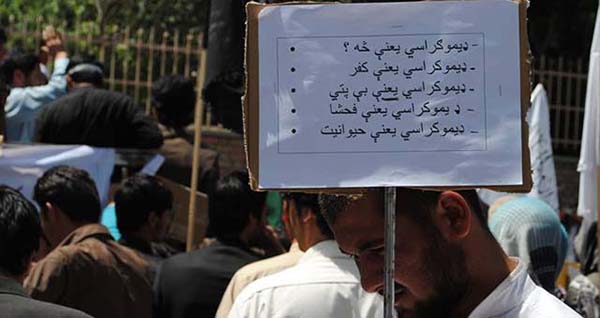KABUL - Hard-line Islamist students protested Wednesday in the Afghan capital demanding the repeal of a presidential decree for women's rights that they say is un-Islamic. It was the latest sign of a backlash against the legal protections passed in the 12 years since the toppling of the Taliban regime known for its harsh treatment of women.
The protest came days after conservative lawmakers' vehement opposition blocked an attempt to cement the decree's provisions in legislation.
Most of international force that ousted the Taliban is now preparing to withdraw by the end of next year, and activists fear an erosion of the women's rights will follow if hard-liners pressure the elected government.
More than 200 male students protested in front of Kabul University on Wednesday against the decree on Elimination of Violence Against Women, which includes a ban on child marriage and forced marriage, makes domestic violence a crime and says rape victims cannot be prosecuted for adultery. It also outlaws "ba'ad," a traditional practice of exchanging women or girls to settle disputes or debts.
Protester Fazel Hadi, 25, said the decree was "imposed by foreigners" and violates Islamic Shariah law.
Mawladad Jalali, the mullah of the university mosque and one of the organizers of the protest, led chants decrying democracy in general and the women's law specifically.
"Our main demand is that this law should be repealed in the parliament," he said before leading a brief march while police who cordoned off the area looked on.
Afghan President Hamid Karzai issued the decree on women's rights three years ago as part of a raft of commitments to international donors, but lawmaker and activist Fawzia Kofi wanted to pass it in parliament to prevent any future president from reversing it.
The brief parliamentary debate Saturday was ended by the speaker after fierce opposition from conservative lawmakers who said several provisions — including the ban on child marriage and jail time for domestic abuse — violated Islamic law. The decree remains in force, but the debate appears to have galvanized opposition to it.
The United Nations' mission in Afghanistan this week urged the government to do more to enforce the women's rights decree, saying it is only sporadically applied when women report abuse. (AP)

